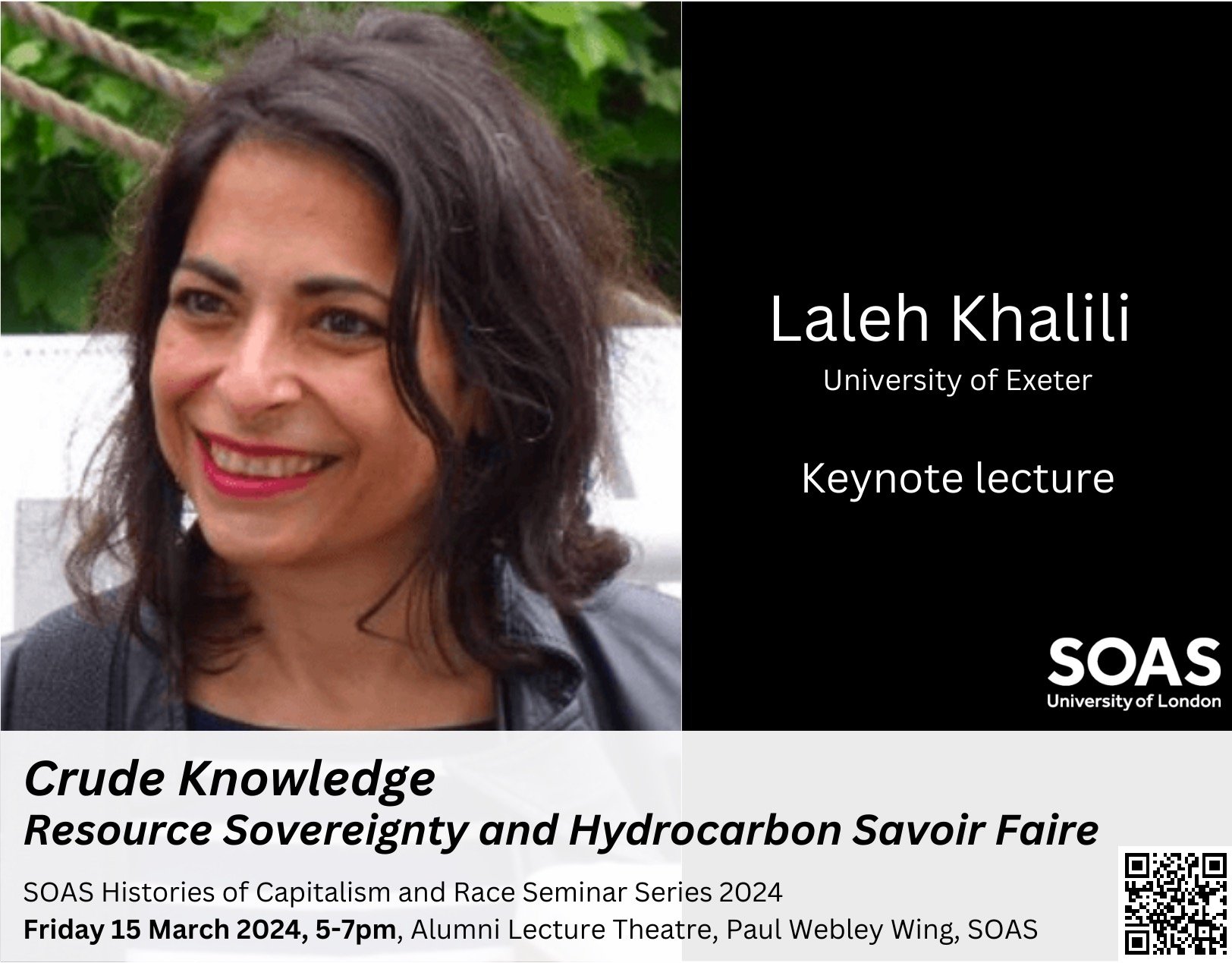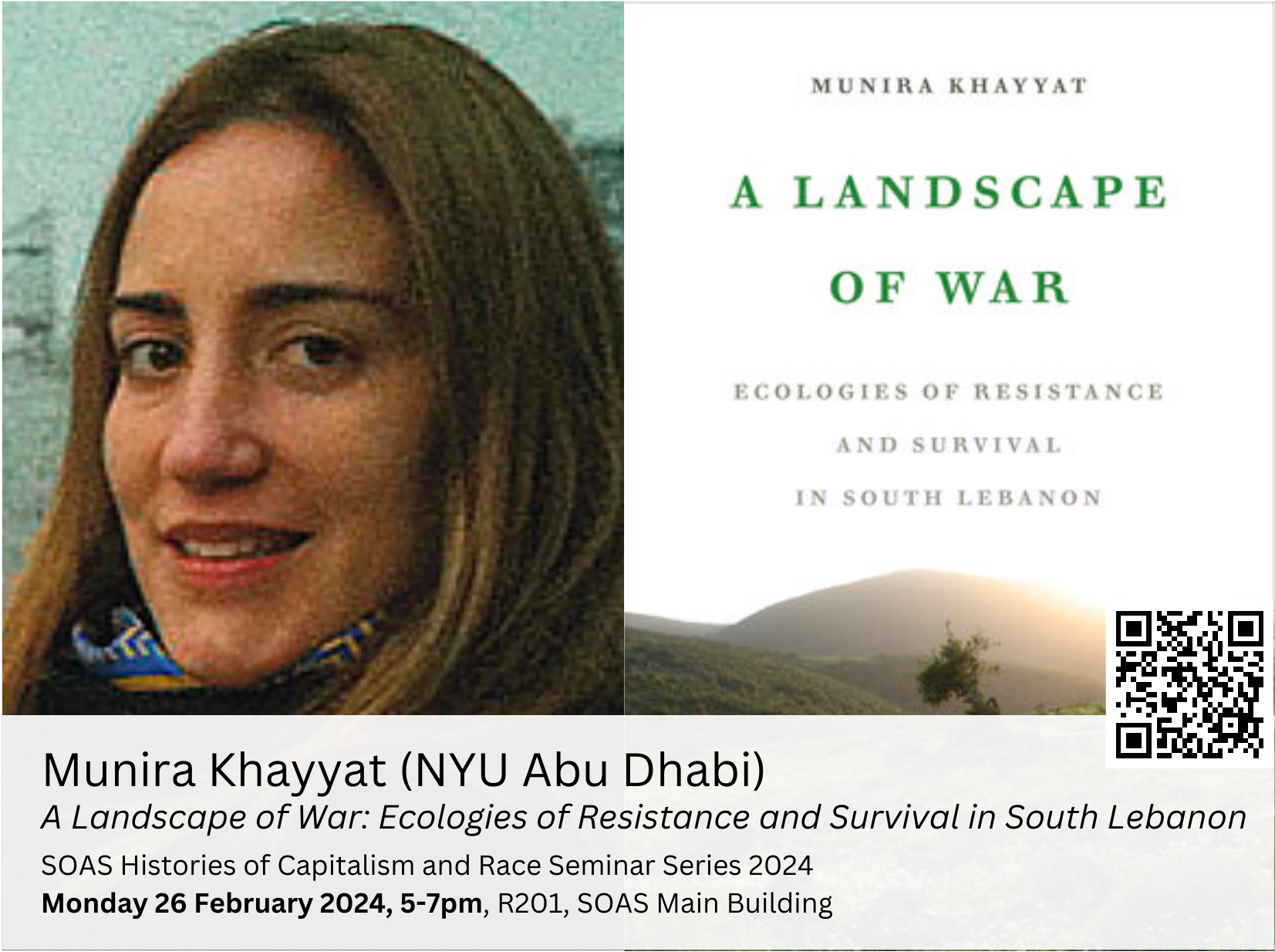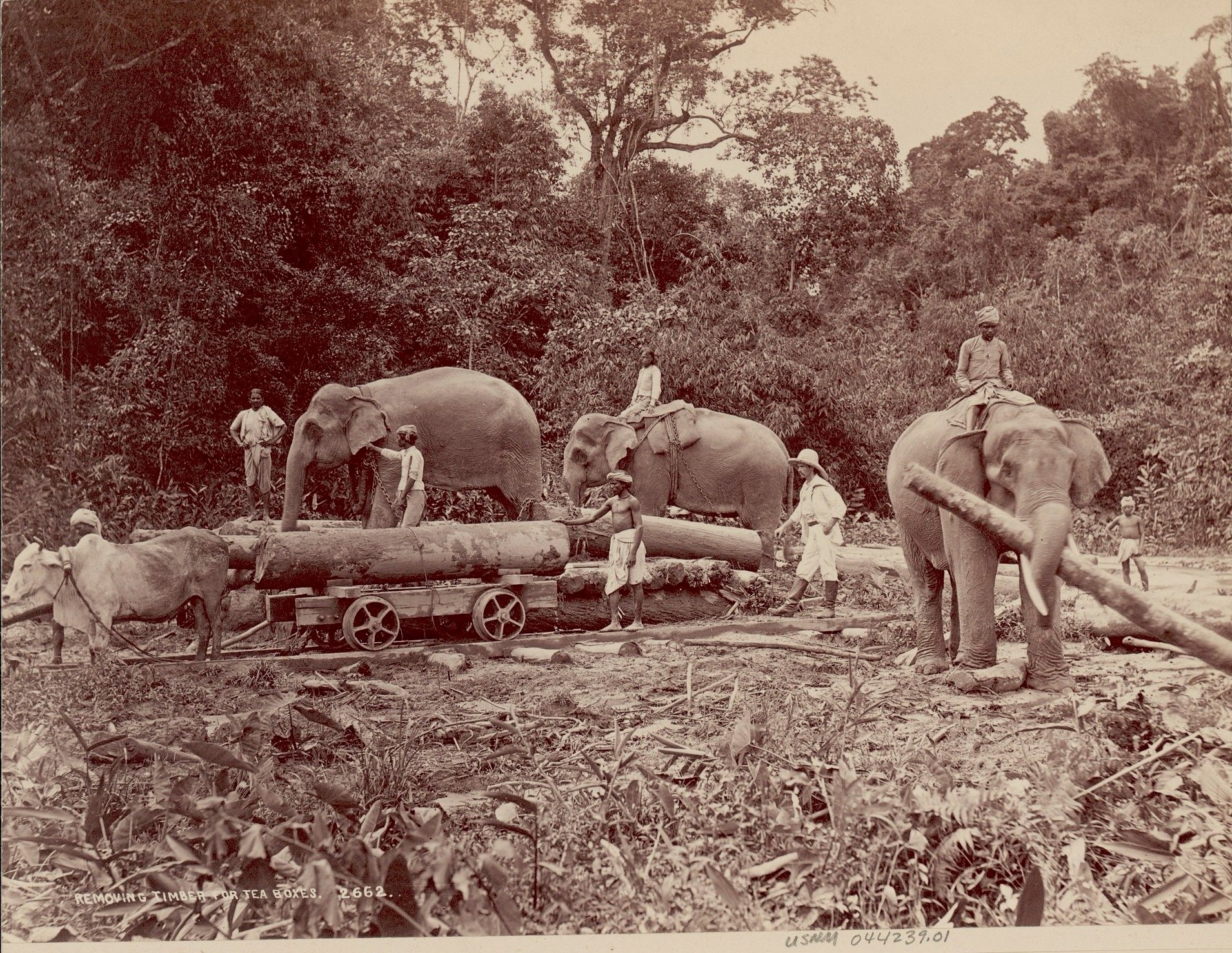
upcoming events

In Conversation: Adam Hanieh on 'Crude Capitalism' and Arang Keshavarzian on 'Making Space for the Gulf'
Join us as we discuss two recently published and long awaited books that bring fresh insight into histories of capitalism, infrastructure and oil in the Middle East, especially the Gulf’s place in global accumulation: Adam Hanieh’s Crude Capitalism: Oil, Corporate Power, and the Making of the the World Market (Verso, 2024) and Arang Keshavarzian’s Making Space for the Gulf: Histories of Regionalism and the Middle East (Stanford University Press, 2024.
This will be an in-person event with the two authors, who will speak about their books in conversation with one another and with all in attendance. Registration is required for attendance - please register here.
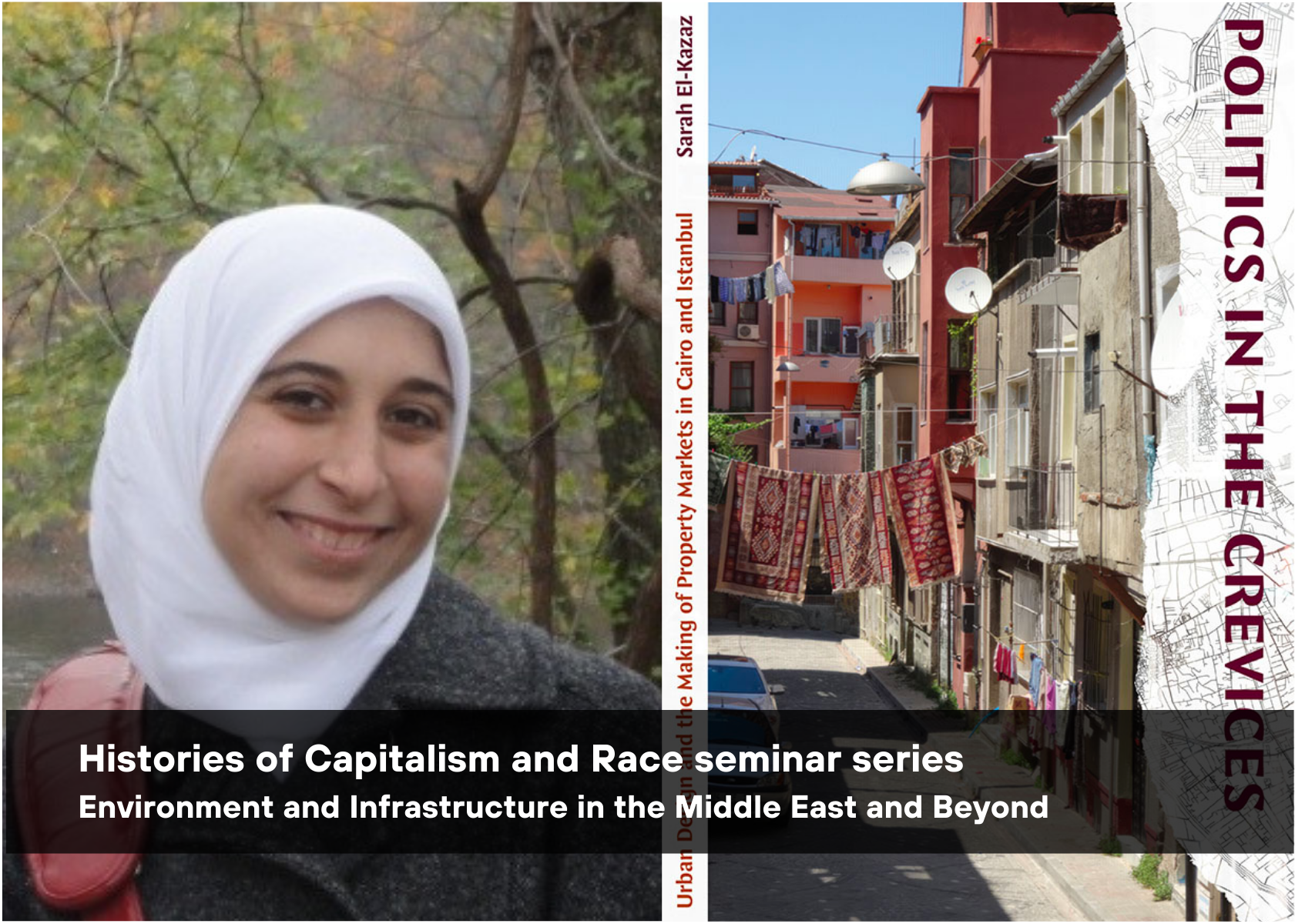
Sarah El-Kazaz, Politics in the Crevices: Urban Design and the Making of Property Markets in Cairo and Istanbul (2023)
Histories of Capitalism and Race: Environment and Infrastructure in the Middle East and Beyond seminar series
Dr Sarah El-Kazaz (SOAS) will be speaking about Politics in the Crevices: Urban Design and the Making of Property Markets in Cairo and Istanbul (Duke University Press, 2023), followed by a group discussion of the book.
Registration is required and attendees are encouraged to read the pre-circulated extracts in advance. Extracts will be sent by email to addresses provided during registration.
Book blurb:
In Politics in the Crevices, Sarah El-Kazaz takes readers into the world of urban planning and design practices in Istanbul and Cairo. In this transnational ethnography of neighborhoods undergoing contested rapid transformations, she reveals how the battle for housing has shifted away from traditional political arenas onto private crevices of the city. She outlines how multiple actors—from highly capitalized international NGOs and corporations to city dwellers, bureaucrats, and planning experts—use careful urban design to empower conflicting agendas, whether manipulating property markets to protect affordable housing or corner luxury real estate. El-Kazaz shows that such contemporary politicizations of urban design stem from unresolved struggles at the heart of messy transitions from the welfare state to neoliberalism, which have shifted the politics of redistribution from contested political arenas to design practices operating within market logics, ultimately relocating political struggles onto the city’s most intimate crevices. In so doing, she raises critical questions about the role of market reforms in redistributing resources and challenges readers to rethink neoliberalism and the fundamental ways it shapes cities and polities.
Registration is required.
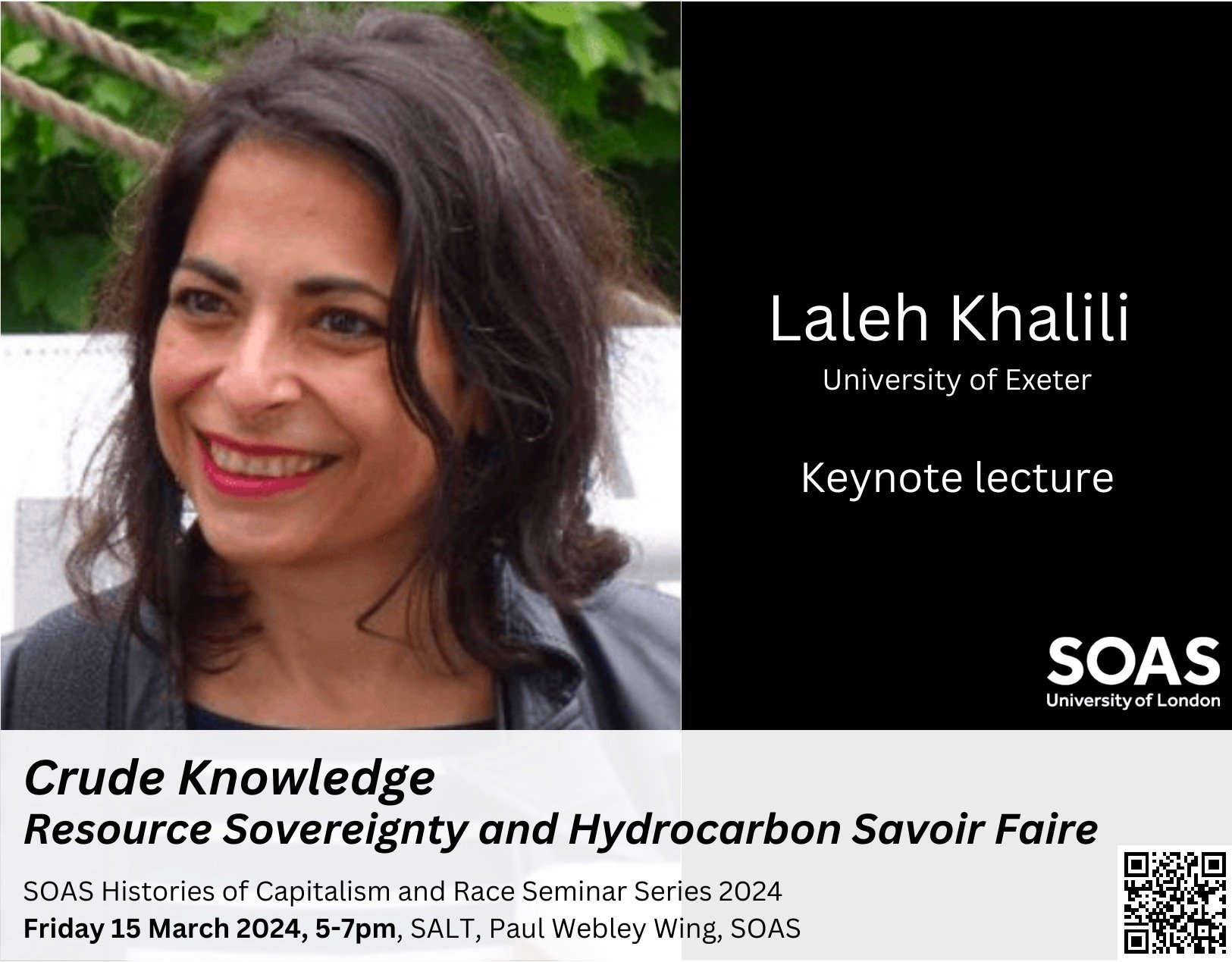
Laleh Khalili, Crude knowledge: Resource sovereignty and hydrocarbon savoir faire
Histories of Capitalism and Race: Environment and Infrastructure in the Middle East and Beyond seminar series
Prof. Laleh Khalili (University of Exeter) will give a keynote lecture entitled Crude Knowledge: Resource Sovereignty and Hydrocarbon Savoir Faire.
Registration is required.
Abstract:
The period of struggle over hydrocarbon sovereignty in the Arab world – the 1950s-1970s – saw a spate of periodicals in Arabic about oil. These included periodicals produced by the public relations departments of Euro-American oil companies, as well as monthlies, weeklies and quarterlies produced by Arab journalists, experts, and former oil revolutionaries in Cairo, Baghdad, Beirut and Kuwait. This lecture argues that the trajectory of these latter publications – both their context and content – traces the massive political transformations that saw a shift of power in the region, alongside a radical transformation in the representation of oil from a public good into a private property.

Laleh Khalili, Sinews of War and Trade: Shipping and Capitalism in the Arabian Peninsula (2020)
Histories of Capitalism and Race: Environment and Infrastructure in the Middle East and Beyond seminar series
Prof. Laleh Khalili (University of Exeter) will be speaking about Sinews of War and Trade: Shipping and Capitalism in the Arabian Peninsula (Verso, 2020), followed by a group discussion of the book.
Registration is required and attendees are encouraged to read the pre-circulated extracts in advance. Extracts will be sent by email to addresses provided during registration.
Book blurb:
On the map of global trade, China is now the factory of the world. A parade of ships full of raw commodities—iron ore, coal, oil—arrive in its ports, and fleets of container ships leave with manufactured goods in all directions. The oil that fuels China’s manufacturing comes primarily from the Arabian peninsula. Much of the material shipped from China are transported through the ports of Arabian peninsula, Dubai’s Jabal Ali port foremost among them. China’s ‘maritime silk road’ flanks the peninsula on all sides.
Sinews of War and Trade is the story of what the making of new ports and shipping infrastructure has meant not only for the Arabian peninsula itself, but for the region and the world beyond. The book is an account of how maritime transportation is not simply an enabling companion of trade, but central to the very fabric of global capitalism. The ports that serve maritime trade, logistics, and hydrocarbon transport create racialised hierarchies of labour, engineer the lived environment, aid the accumulation of capital regionally and globally, and carry forward colonial regimes of profit, law and administration.
Registration is required.

Hannah Appel, The Licit Life of Capitalism: US Oil in Equatorial Guinea (2019)
Histories of Capitalism and Race: Environment and Infrastructure in the Middle East and Beyond seminar series
Prof. Hannah Appel (UCLA) will be speaking about The Licit Life of Capitalism: US Oil in Equatorial Guinea (Duke University Press, 2019), followed by a group discussion of the book.
Registration is required and attendees are encouraged to read the pre-circulated extracts in advance. Extracts will be sent by email to addresses provided during registration.
Book blurb:
The Licit Life of Capitalism is both an account of a specific capitalist project—U.S. oil companies working off the shores of Equatorial Guinea—and a sweeping theorization of more general forms and processes that facilitate diverse capitalist projects around the world. Hannah Appel draws on extensive fieldwork with managers and rig workers, lawyers and bureaucrats, the expat wives of American oil executives and the Equatoguinean women who work in their homes, to turn conventional critiques of capitalism on their head, arguing that market practices do not merely exacerbate inequality; they are made by it. People and places differentially valued by gender, race, and colonial histories are the terrain on which the rules of capitalist economy are built. Appel shows how the corporate form and the contract, offshore rigs and economic theory are the assemblages of liberalism and race, expertise and gender, technology and domesticity that enable the licit life of capitalism—practices that are legally sanctioned, widely replicated, and ordinary, at the same time as they are messy, contested, and, arguably, indefensible.
Registration is required.

Munira Khayyat, A Landscape of War: Ecologies of Resistance and Survival in South Lebanon (2022)
Histories of Capitalism and Race: Environment and Infrastructure in the Middle East and Beyond seminar series
Dr Munira Khayyat (NYU Abu Dhabi) will be speaking about A Landscape of War: Ecologies of Resistance and Survival in South Lebanon (University of California Press, 2022), followed by a group discussion of the book.
Registration is required and attendees are encouraged to read the pre-circulated extracts in advance. Extracts will be sent by email to addresses provided during registration.
Book blurb:
What worlds take root in war? In this book, anthropologist Munira Khayyat describes life along the southern border of Lebanon, where resistant ecologies thrive amid a terrain of perennial war. A Landscape of War takes us to frontline villages where armed invasions, indiscriminate bombings, and scattered land mines have become the environment where everyday life is waged. This book dwells with multispecies partnerships such as tobacco farming and goatherding that carry life through seasons of destruction. Neither green-tinged utopia nor total devastation, these ecologies make life possible in an insistently deadly region. Sourcing an anthropology of war from where it is lived, this book decolonizes distant theories of war and brings to light creative practices forged in the midst of ongoing devastation. In lyrical prose that resonates with imperiled conditions across the Global South, Khayyat paints a portrait of war as a place where life must go on.
Registration is required.

Jessica Barnes, Staple Security: Bread and Wheat in Egypt (2022)
Histories of Capitalism and Race: Environment and Infrastructure in the Middle East and Beyond seminar series
Dr Jessica Barnes (University of South Carolina) will be speaking about Staple Security: Bread and Wheat in Egypt (Duke University Press, 2022), followed by a group discussion of the book.
Registration is required and attendees are encouraged to read the pre-circulated extracts in advance. Extracts will be sent by email to addresses provided during registration.
Book blurb:
Egyptians often say that bread is life; most eat this staple multiple times a day, many relying on the cheap bread subsidized by the government. In Staple Security, Jessica Barnes explores the process of sourcing domestic and foreign wheat for the production of bread and its consumption across urban and rural settings. She traces the anxiety that pervades Egyptian society surrounding the possibility that the nation could run out of wheat or that people might not have enough good bread to eat, and the daily efforts to ensure that this does not happen. With rich ethnographic detail, she takes us into the worlds of cultivating wheat, trading grain, and baking, buying, and eating bread. Linking global flows of grain and a national bread subsidy program with everyday household practices, Barnes theorizes the nexus between food and security, drawing attention to staples and the lengths to which people go to secure their consistent availability and quality.
Registration is required.

Caterina Scaramelli, How to Make a Wetland: Water and Moral Ecology in Turkey (2021)
Histories of Capitalism and Race: Environment and Infrastructure in the Middle East and Beyond seminar series
Dr Caterina Scaramelli (Boston University) will be speaking about How to Make a Wetland: Water and Moral Ecology in Turkey (Stanford University Press, 2021), followed by a group discussion of the book.
Registration is required and attendees are encouraged to read the pre-circulated extracts in advance. Extracts will be sent by email to addresses provided during registration.
Book blurb:
How to Make A Wetland tells the story of two Turkish coastal areas, both shaped by ecological change and political uncertainty. On the Black Sea coast and the shores of the Aegean, farmers, scientists, fishermen, and families grapple with livelihoods in transition, as their environment is bound up in national and international conservation projects. Bridges and drainage canals, apartment buildings and highways—as well as the birds, water buffalo, and various animals of the regions—all inform a moral ecology in the making.
Drawing on six years of fieldwork in wetlands and deltas, Caterina Scaramelli offers an anthropological understanding of sweeping environmental and infrastructural change, and the moral claims made on livability and materiality in Turkey, and beyond. Beginning from a moral ecological position, she takes into account the notion that politics is not simply projected onto animals, plants, soil, water, sediments, rocks, and other non-human beings and materials. Rather, people make politics through them. With this book, she highlights the aspirations, moral relations, and care practices in constant play in contestations and alliances over environmental change.
Registration is required.
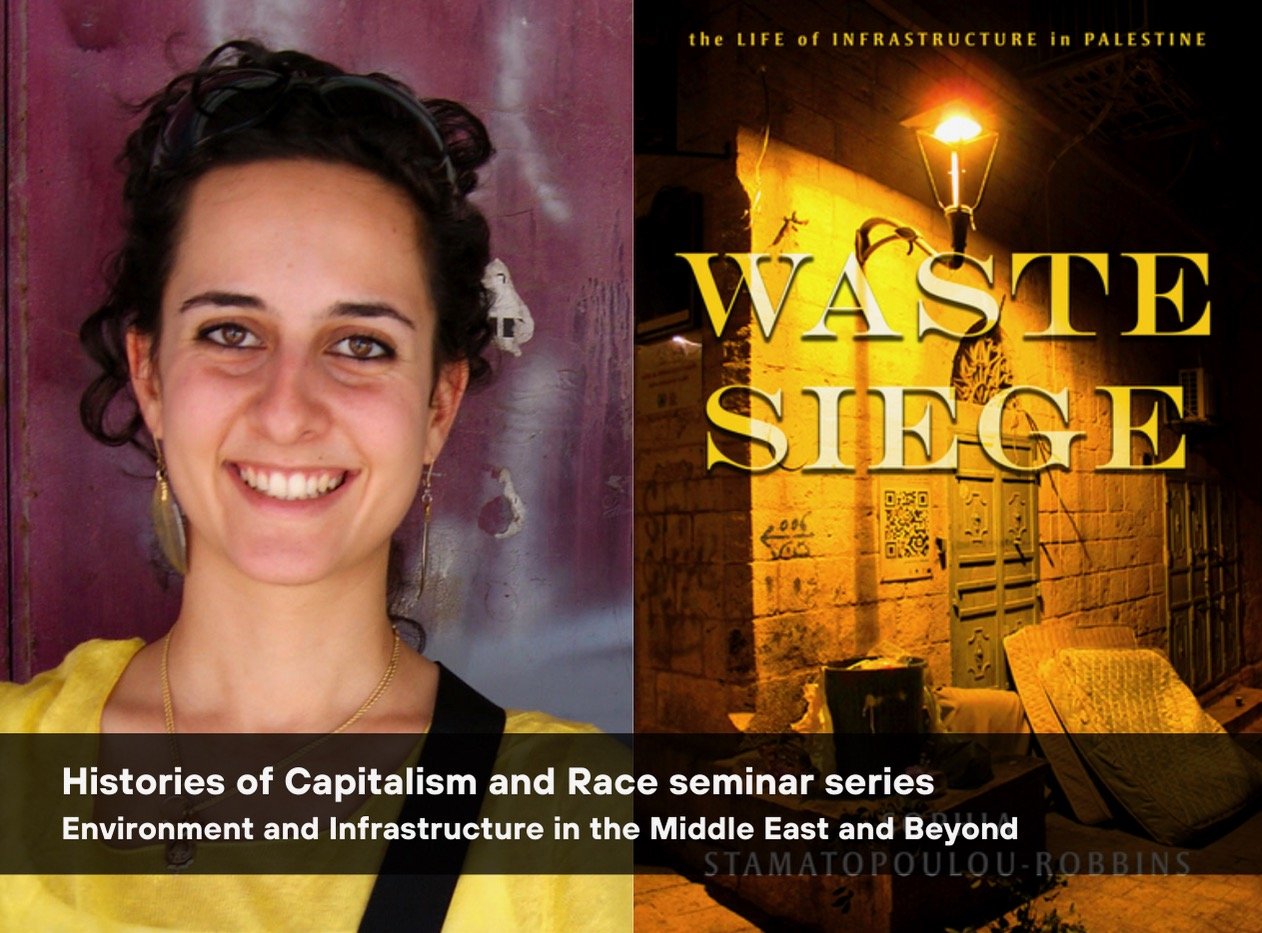
Sophia Stamatopoulou-Robbins, Waste Siege: The Life of infrastructure in Palestine (2019)
Histories of Capitalism and Race: Environment and Infrastructure in the Middle East and Beyond seminar series
Dr Sophia Stamatopoulou-Robbins (Bard College) will be speaking about Waste Siege: The Life of Infrastructure in Palestine (Stanford University Press, 2019), followed by a group discussion of the book.
Registration is required and attendees are encouraged to read the pre-circulated extracts (introduction and chapters 2 and 3) in advance. Extracts will be sent by email to addresses provided during registration.
Book blurb:
Waste Siege offers an analysis unusual in the study of Palestine: it depicts the environmental, infrastructural, and aesthetic context in which Palestinians are obliged to forge their lives. To speak of waste siege is to describe a series of conditions, from smelling wastes to negotiating military infrastructures, from biopolitical forms of colonial rule to experiences of governmental abandonment, from obvious targets of resistance to confusion over responsibility for the burdensome objects of daily life. Within this rubble, debris, and infrastructural fallout, West Bank Palestinians create a life under settler colonial rule.
Sophia Stamatopoulou-Robbins focuses on waste as an experience of everyday life that is continuous with, but not a result only of, occupation. Tracing Palestinians' own experiences of wastes over the past decade, she considers how multiple authorities governing the West Bank—including municipalities, the Palestinian Authority, international aid organizations, NGOs, and Israel—rule by waste siege, whether intentionally or not. Her work challenges both common formulations of waste as "matter out of place" and as the ontological opposite of the environment, by suggesting instead that waste siege be understood as an ecology of "matter with no place to go." Waste siege thus not only describes a stateless Palestine, but also becomes a metaphor for our besieged planet.
Registration is required.
Roundtable: Infrastructural and Environmental Politics in Palestine
Join us for a roundtable discussion on ‘Infrastructural and Environmental Politics in Palestine’, featuring Omar Jabary Salamanca (University of Ghent), Sharri Plonski (Queen Mary, University of London), Muna Dajani (LSE), and Mattin Biglari (University of Bristol).
This roundtable discussion focuses on the contemporary and historical politics of infrastructure and environment in Palestine, particularly in relation to to Israel’s settler colonial project and the unfolding genocide in Gaza. The roundtable inaugurates a new seminar series organised by the SOAS Walter Rodney Collective on ‘Environment and Infrastructure in the Middle East and Beyond’, taking place at SOAS during spring term 2024.
The event is welcome to all but registration is required (more details to follow).

Dr Timothy Mitchell Speaking about his new book project
Histories of Capitalism and Race in the Middle East and Indian Ocean seminar series
Dr Timothy Mitchell will be speaking about his new book project, followed by a group discussion of the book. Registration is required and attendees are encouraged to read the pre-circulated extracts in advance.

Dr Andrew b. Liu (Villanova University), Tea War: A History of Capitalism in China and India (2020)
Histories of Capitalism and Race in the Middle East and Indian Ocean seminar series
Dr Andrew B. Liu will be speaking about Tea War: A History of Capitalism in China and India (Yale University Press, 2020), followed by a group discussion of the book. Registration is required and attendees are encouraged to read the pre-circulated extracts in advance.

Dr Katayoun Shafiee (University of Warwick), Machineries of Oil: An Infrastructural History of BP in Iran (2018)
Histories of Capitalism and Race in the Middle East and Indian Ocean seminar series
Dr Katayoun Shafiee will be speaking about Machineries of Oil: An Infrastructural History of BP in Iran (MIT Press, 2018), followed by a group discussion of the book. Registration is required and attendees are encouraged to read the pre-circulated extracts in advance.

Dr Johan Mathew (Rutgers University), Margins of the Market: Trafficking and Capitalism across the Arabian Sea (2016)
Histories of Capitalism and Race in the Middle East and Indian Ocean seminar series
Dr Johan Mathew will be speaking about Margins of the Market: Trafficking and Capitalism Across the Arabian Sea (University of California Press, 2016), followed by a group discussion of the book. Registration is required and attendees are encouraged to read the pre-circulated extracts in advance.

Dr Nurfadzilah Yahaya (Yale University), Fluid Jurisdictions: Colonial Law and Arabs in Southeast Asia (2020)
Histories of Capitalism and Race in the Middle East and Indian Ocean seminar series
Dr Nurfadzliah Yahaya will be speaking about Fluid Jurisdictions: Colonial Law and Arabs in Southeast Asia (Cornell University Press, 2020), followed by a group discussion of the book. Registration is required and attendees are encouraged to read the pre-circulated extracts in advance.

Dr Aaron Jakes (University of Chicago), Egypt’s Occupation: Colonial Economism and the Crises of Capitalism (2020)
Histories of Capitalism and Race in the Middle East and Indian Ocean seminar series
Dr Aaron Jakes will be speaking about Egypt’s Occupation: Colonial Economism and the Crises of Capitalism (Stanford University Press, 2020), followed by a group discussion of the book. Registration is required and attendees are encouraged to read the pre-circulated extracts in advance.

Dr Muriam Haleh Davis (UC Santa Cruz), Markets of Civilization: Islam and Racial Capitalism in Algeria (2022)
Histories of Capitalism and Race in the Middle East and Indian Ocean seminar series
Dr Muriam Haleh Davis will be speaking about Markets of Civilization: Islam and Racial Capitalism in Algeria (Duke University Press, 2022), followed by a group discussion of the book. Registration is required and attendees are encouraged to read the pre-circulated extracts in advance.

Dr Alden Young (UCLA), Transforming Sudan: Decolonization, Economic Development, and State Formation (2017)
Histories of Capitalism and Race in the Middle East and Indian Ocean seminar series
Dr Alden Young will be speaking about Transforming Sudan: Decolonization, Development, and State Formation (Cambridge University Press, 2017), followed by a group discussion of the book. Registration is required and attendees are encouraged to read the pre-circulated extracts in advance.

Dr Nada Moumtaz (University of Toronto), God’s Property: Islam, Charity and the Modern State (2021)
Histories of Capitalism and Race in the Middle East and Indian Ocean seminar series
Dr Nada Moumtaz will speak about God's Property: Islam, Charity and the Modern State (University of California Press, 2021), followed by a group discussion of the book. Registration is required and attendees are encouraged to read the pre-circulated extracts in advance.

How Europe Underdeveloped Africa: 50 Years On
Join us for the inaugural event of the SOAS Walter Rodney Collective, a new research cluster named in honour of the influential SOAS alumnus and pan-African, Marxist scholar-activist. The collective is hosted by the School of History, Religions and Philosophies at SOAS, University of London.
Marking the 50th anniversary of Walter Rodney’s How Europe Underdeveloped Africa (1972), this event will feature scholars of racial capitalism, Dr Madalitso Zililo Phiri (University of Johannesburg) and Rafeef Ziadah (KCL) as part of a roundtable discussion with SOAS faculty and students. What is this book’s legacy and the lessons it continues to offer for historical research today? What is the significance of this text for thinking through SOAS’s own colonial legacy–and its radical potential?

Histories of capitalism & race Workshop
Hosted by the School of History, Religions, and Philosophies at SOAS, this workshop aims to generate discussion about what it means to think about histories of capitalism and race beyond Eurocentric conceptual frameworks – and how starting from the histories of Asia and Africa offers alternative theoretical starting points.




